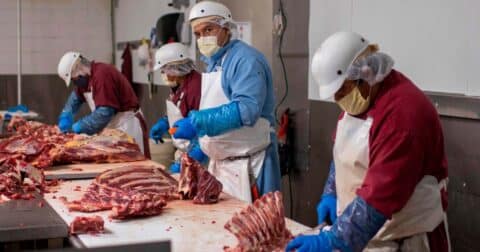News
A Major Agreement to Protect the Amazon Is Falling Apart After 20 Years
Climate•6 min read
Investigation
Amid a deregulatory blitz, trade group pushes for rollback on environmental regulations, worker protections and food safety.


Words by Nina B. Elkadi
The Clean Water Act, salmonella inspections and equity in the Packers and Stockyards Act are just a few of the regulations that the industry lobbying group the Meat Institute, formerly known as the North American Meat Institute, is calling for the Trump administration to pull back.
On January 27, Meat Institute president Julie Anna Potts penned a letter to the White House providing the new administration with “strategies to reduce burdensome regulations and address meat prices for consumers.” In the letter, Potts blames the previous administration for inflation, which she claims was caused by increased regulation in the food industry. Potts also targets increased worker protections against discrimination, which she claims are part of diversity, equity and inclusion practices.
“Based on what they propose, the path to lower food prices is exploiting child labor and engaging in sharecropping production models,” Austin Frerick, antitrust expert and author of Barons: Money, Power, and the Corruption of America’s Food Industry, tells Sentient. “They’re grab-bagging words in the moment to fit their deregulatory race to the bottom.”
If Trump takes the advice of this lobbying group — which touts its representation of meat packers and processors that “account for more than 95 percent of U.S. output” of processed meats — experts do not agree that prices will necessarily go down. According to Food & Water Watch staff attorney Emily Miller, the real issue at play is consolidation in the industry.
“We know that the real cost of high food prices in this country is not inflation or the cost of regulatory compliance, as the industry is claiming. It’s corporate consolidation and greed,” Miller says. “Rolling back regulations that are meant to protect farmers, slaughterhouse workers, frontline communities and consumers from exploitation and pollution will just allow the meat industry to break even more profit.”
While food prices have increased at a fast rate — as much as 2.5 times the rate of inflation — corporate profits have sky-rocketed five times faster than inflation. Four companies control around 70 percent of the pork industry and four companies control more than half the chicken processing market.
Even if the industry successfully de-regulates and lowers costs associated with stricter environmental and worker protections, there is no guarantee that would result in lower food prices. Corporations can continue to pocket the difference.
One rule the Meat Institute wants to rescind is the Inclusive Competition and Market Integrity Under the Packers and Stockyards Act. The rule, which went into effect in 2024, “prohibits the adverse treatment of livestock producers and poultry growers based on race, color, religion, national origin, sex (including pregnancy, sexual orientation, and gender identity), disability, marital status, or age.”
The Meat Institute claims this rule “attempts to enshrine” diversity, equity and inclusion concepts into the act.
“I think this is definitely a way of baiting Trump to act,” Miller says. “What they’re really asking, pretty unabashedly, is for the ability to discriminate against other people for personal characteristics that have nothing to do with their business or the economy or anything that would have any sort of justification, which is pretty outrageous.”
Another set of protections the Meat Institute targets in its bid to the new administration relates to contract chicken producers — farmers who raise chickens on a contract basis for mega-corporations like Tyson Foods. Passed under the Biden administration, the regulations had been intended in part to help chicken farmers who end up taking on enormous debts as part of their contractual agreements with poultry companies.
The Clean Water Act is considered one of the cornerstones of environmental protection in the U.S., but when it comes to regulating the discharges from agriculture, it has long fallen short. Clawing back the already weakened regulatory power of the act could further pollute waterways that are already in poor shape, especially in states with increasing density of factory farms. For instance, more than half of rivers and streams are degraded in Iowa — a state where most counties are “severely or highly concentrated with factory farms.”
Miller, of Food & Water Watch, notes that the federal government is under a court enforceable settlement that requires them to finalize the rule the Meat Institute wants to disassemble. Any effort to roll that back, she says, would be in direct violation of the settlement.
“The industry would, of course, want the least amount of regulation possible and to maintain the status quo that allows them to really harm the communities that neighbor these operations, which overwhelmingly are low income communities of color,” she says.
In states dominated by factory farms, manure discharged into waterways has led to detrimental health outcomes, fish kills and higher drinking water costs.
In addition, much of the meat produced in Iowa factory farms is in turn exported. “We’re basically destroying rural communities in the Midwest, notably Iowa, to feed foreign nations,” Frerick says. “The environmental destruction these production models do and that says something when it’s cheaper to do it here than in China.”
Frerick argues that Republican administrations “turbocharge” the race to the bottom with de-regulation, opening the doors for catastrophic changes to not only the food system itself, but consumer trust and confidence that they are getting a safe product.
“You’re playing Russian Roulette with people’s health and safety. If you have one big scandal, one big outbreak, you could really shift people’s consumption and food diets in profound ways that really can wreck an industry,” Frerick says.
Pulling back proposed salmonella regulation could endanger consumers, Jaydee Hanson, Policy Director of the Center for Food Safety tells Sentient. Meat Institute is calling to replace a proposed rule that would increase monitoring in the poultry slaughter process with “a performance standard with the input of stakeholders.”
“I’m concerned that the next thing they’ll be pushing for is less aggressive enforcement of rules on E coli,” he tells Sentient. “We don’t want to go back to poor inspection with state inspectors that are being bribed and say that that’s going to give us cheaper meat.”
“You want a regulatory system where consumers know they’re getting a healthy, safe product that was produced in a way that was ethical,” Frerick says. “When you get rid of that, you’re incentivizing the worst people.”
“Any regulatory rollbacks that allow the meat industry to further consolidate its market power will just have the opposite effect on consumers and on food prices generally,” Miller says. “Efforts to roll those things back would just continue to inflict harm on the people who are growing and producing our food in this country, and simply give a bigger profit margin to the corporations that are at the top of the food chain.”
Though no distinct moves have been made to address the Meat Institute’s requests, on January 31, the Trump White House announced a de-regulatory blitz, requiring that “whenever an agency promulgates a new rule, regulation, or guidance, it must identify at least 10 existing rules, regulations, or guidance documents to be repealed.”
“Concentrated markets gouge. It’s what they do. You see innovation and quality decline,” Frerick tells Sentient. “Once you add in the cost, the negative externalities, all the pollution stuff, it’s even more expensive. So we’re being doubly-screwed, to be blunt.”